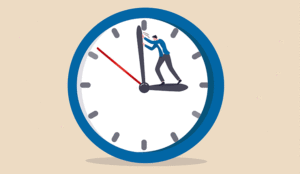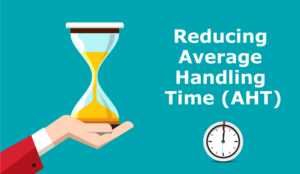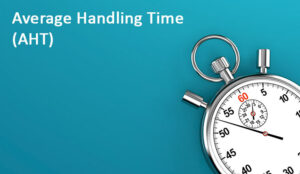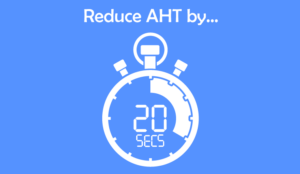Our readers share their ways to improve average handling time, AHT, in the contact centre.
How to Reduce AHT
1. Automate simpler queries to reduce the general workload
It can sometimes help to take the simpler calls out of the equation by automating them. While this may mean that the AHT figures for individual calls will rise, due to the increase in complexity, the general workload will decrease.
This will have a positive impact on the overall amount of time your callers spend on the phones.
With thanks to Craig
2. “Acknowledge, Answer, Ask” can make each call more efficient
I recommend my team use the “Acknowledge, Answer, Ask” method.
Acknowledge what the customer says to indicate understanding, Answer the customer’s question in a positive and direct way, and then Ask the question that can logically move the call forward.
This systematic and focused approach can help you to improve upon your AHT.
With thanks to Elizabeth
3. Cut down on after-call work (ACW) instead of customer talk time
Focus on reducing the time spent in after-call work (ACW) instead of talk time.
You shouldn’t be cutting down on talk time with your customers… because they will notice!
With thanks to Esther
4. Aim to resolve every customer query on the first contact
If you place emphasis on First Contact Resolution (FCR) then your agents will spend just one call on a customer’s issue – rather than five.
With thanks to Jacco
For some ideas on reducing First Contact Resolution, take a look at these 22 Ways to Improve First Contact Resolution.
5. Wrap-up codes can drive up unproductive time

We used wrap-up codes to get a better understanding of what constituted our agents’ after-call work (ACW).
We found that this practice actually drove up overall unproductive time because the agents hid in multiple codes.
With thanks to George
6. Ask your agents for the improvements that are needed
We went out to our agents to seek the types of system improvements that they felt would help the overall experience for them and the customer.
We gained funding to action the vast majority of the requests. This has helped significantly.
With thanks to David
We went out to our agents to seek the types of system improvements that they felt would help the overall experience for them and the customer.
David
7. Route calls based on an agent’s ability to resolve that particular query
We use an IVR that routes each call to an agent specifically trained in resolving that query.
It can cause problems, however, if the customer presses the wrong button in the IVR.
With thanks to David
Take a read of A Guide to Call Routing in the Contact Centre, for advice on the benefits of Call Routing and the future in Intelligent Call Routing, given by industry experts.
8. Use AHT as a training tool
We use AHT as a training tool to increase efficiencies.
With thanks to Janet
9. Use AHT to help deal with callers with a tendency to babble
We use AHT as an indicator for the callers that tend to babble.
In these situations, we find that agents taking ownership is key.
With thanks to Yvonne
10. Get your agents to identify where too much time is being spent
Have your agents listen to their calls and grade their call.
Get them to answer “What are the ‘extras’ included in your calls that aren’t necessary?”
With thanks to Janet
For some tips on collecting advisor feedback, take a read of this article that gives 14 ways to gather front line opinions.
11. Focus on areas that don’t affect the customer experience

Focus on reducing the time spent in areas that don’t affect the customer experience.
For example, leaving diary notes, finding answers to queries on the call, etc.
With thanks to Paddy
12. Encourage cross-functional working
Encourage cross-functional working together to ensure outside service areas understand the impacts of their actions, e.g. R&D.
Thanks to Karl
13. Scripts can hinder active listening
If not used as guide, scripts can take away from active listening by your team.
With thanks to Melody
Have a read of these 16 Mistakes to Avoid With Call Scripting.
14. Reassess your scripts for time-wasting questions
Look at the content of your agents’ scripts.
It might be the script itself that contains things that don’t need to be there.
With thanks to Paddy
15. Have different levels of scripting depending on the knowledge of staff

If using a CRM with scripting, have different levels of scripting depending on the knowledge of staff.
‘Expert’ staff can rattle through calls without the hand-holding scripts needed by staff with less knowledge.
With thanks to Lee
16. Don’t pin the blame solely on your agents
Never assume it is the staff member at fault.
Sit with your staff, understand the processes they have to go through and identify changes that can be made.
With thanks to Emma
Never assume it is the staff member at fault. Sit with your staff, understand the processes they have to go through and identify changes that can be made. Emma
17. Target wrap time as a percentage of talk time
When not wanting to jeopardise customer experience and quality, I find it more effective and less detrimental to target wrap time as a % of talk time.
With thanks to Paddy
18. Promote your company website to drive down overall customer contact

Invest in increasing the AHT slightly by giving the agents extra time on the call to promote using a website as the first point of contact in the future.
This will drive down future overall volume, meaning cost savings through reducing headcount.
With thanks to George
This would prove an effective way to deal with impatient customers, and take a read of this article for more tips.
19. Enrol struggling agents on an 8-week programme to reduce their AHT
We have an 8-week programme for those agents who are consistently above our AHT expectations. This expectation is set using a call centre-wide AHT average as a benchmark (with 12 weeks’ worth of data).
Once on this programme, our agents are buddied with fellow advisors and different team leaders in order for them to gain a new perspective in handling calls efficiently.
With thanks to Matt
20. Build a customer-focused website to reduce incoming calls
Build a customer-focused website to encourage customers to use this as a first point of contact.
Customers can also be referred to online resources once they contact the call centre, which can help reduce AHT, improve productivity and improve handling volume.
With thanks to Laura
Customers can also be referred to online resources once they contact the call centre, which can help reduce AHT, improve productivity and improve handling volume.Laura
21. Coach agents on what defines the beginning, middle and end of a call
During coaching sessions, break the call down into 3 elements (beginning, middle and end).
Also highlight the phrases that keep the conversation moving.
With thanks to Jade
Click here for our 49 Tips for Reducing Average Handling Time
What have you done to reduce Average Handling Time (AHT) in your contact centre?
Author: Robyn Coppell
Reviewed by: Megan Jones
Published On: 11th Feb 2015 - Last modified: 4th Apr 2024
Read more about - Hints and Tips, After Call Work (ACW), Average Handling Time (AHT), Call Handling, Editor's Picks, First Contact Resolution (FCR)






































We pay close attention to the agents with high AHT. Listening their calls more frequently to determine the reason. In most cases the lack of knowledge or self confidence causes high AHT. We include these agents in our 4 week CIP process, with specific subjects tailored for the specific agent.